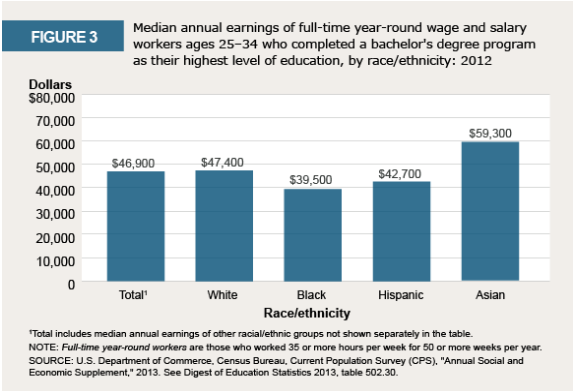The Dollars and Cents Argument for a Bachelor’s – and Beyond
The Department of Education’s latest Condition of Education report adds to the growing evidence that there is an earnings premium associated with higher levels of education.
According to the report, on average, more than 70 percent of young adults who completed a bachelor’s degree program as their highest level of education worked at full-time, year-round jobs in 2012 in the US. That compares with 60 percent of high school graduates and about 50 percent of young adults who didn’t graduate from high school.
The report’s annual earnings indicator focused on the earnings of young adults ages 25-34, based on data from the Census Bureau’s Current Population Survey. AIR experts worked with data, conducted statistical analysis and testing, wrote key findings, and created many of the indicators found in the report.

The data show that there is an earnings premium associated with completing a bachelor’s degree: Median annual earnings of bachelor’s degree recipients ($46,900) were more than 50 percent higher than high school graduates’ ($30,000); and young adults with a bachelor’s degree earned more than twice as much as those without a high school degree ($22,900). This difference may arise from skills obtained in the course of education, as well as differences in the underlying abilities and personal preferences of those who drop out of school compared to those who complete a bachelor’s degree[1]. This earnings difference by educational attainment also shows up within gender and racial/ethnic groups.
- Males with a bachelor’s degree earned $50,000 a year, compared with $32,800 for male high school graduates and $24,600 for males who did not complete high school.
- For White young adults, the median earnings for those with a bachelor’s degree ($47,400) were about 50 percent higher than high school graduates’ ($32,300). And White young adults with a bachelor’s degree made about twice as much as those without high school credentials ($24,600).
- Black young adults with a bachelor’s degree earned $39,500, while Black high school graduates earned $26,400. Their peers who did not complete high school made only $21,100.

But within these numbers, there’s another story—of significant differences in wages based on gender and race.
- Median earnings were higher for young adult males than for young adult females at every education level. For example, men with a bachelor’s degree earned $50,000 a year; women earned $42,900. Men with a master’s or higher degree made $65,000, while women made $53,500.
- Median earnings were higher for White young adults than for Black and Hispanic young adults at every education level—except for the two ends of the educational scale (i.e., those who did not complete high school or those who earned a master’s degree or higher). Among bachelor’s degree recipients, White young adults earned $8,000 (or 20 percent) more than Black and $4,800 (11 percent) more than Hispanic young adults.

Even within gender and racial/ethnic disparities, the numbers suggest that getting a bachelor’s degree still pays dividends.
[1] Altonji, J. G. (1993). The demand for and return to education when education outcomes are uncertain. Journal of Labor Economics, 11, 48-83. Ross, T., Kena, G., Rathbun, A., KewalRamani, A., Zhang, J., Kristapovich, P., and Manning, E. (2012). Higher Education: Gaps in Access and Persistence Study (NCES 2012-046). U.S. Department of Education, National Center for Education Statistics. Washington, DC: Government Printing Office. Eckstein, Z., and Kenneth I. W. (1999). Why Youths Drop Out of High School: The Impact of Preferences, Opportunities, and Abilities. Econometrica 67(6):1295-1339.
Jijun Zhang is a senior research analyst at AIR and a co-author of the congressionally mandated report on the Condition of Education 2014. Her research has focused on the economics of education, teacher quality, teacher retention, and gender gaps.
